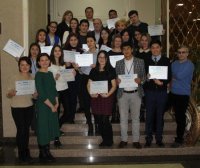 25 journalists and media workers from various regions
of Kyrgyzstan have been trained to counter the propaganda of violent extremism
and hate in the media. The training programme was developed by a team of local
and international trainers based on the findings of the media-monitoring sphere
of Kyrgyzstan and with the use of new interactive tools.
25 journalists and media workers from various regions
of Kyrgyzstan have been trained to counter the propaganda of violent extremism
and hate in the media. The training programme was developed by a team of local
and international trainers based on the findings of the media-monitoring sphere
of Kyrgyzstan and with the use of new interactive tools.
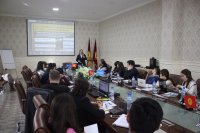 The participants have learned about the media used by
banned groups to spread extremist propaganda, the mistakes made by journalists
and users that lead to the propaganda of extremism, how hate speech and
Islamophobia affect the radicalisation of the media. A few sessions have been
dedicated to the key aspects of religious safety of Kyrgyzstan, legal standards
of international laws on violent extremism, radicalism and terrorism, communication’s
methods between official bodies and media outlets when covering security
issues.
The participants have learned about the media used by
banned groups to spread extremist propaganda, the mistakes made by journalists
and users that lead to the propaganda of extremism, how hate speech and
Islamophobia affect the radicalisation of the media. A few sessions have been
dedicated to the key aspects of religious safety of Kyrgyzstan, legal standards
of international laws on violent extremism, radicalism and terrorism, communication’s
methods between official bodies and media outlets when covering security
issues.
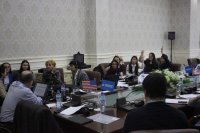 The participants have applied the skills they acquired
to situational group games and practical exercises, and have jointly developed
recommendations on "What journalists can and must do to cover the events
related to extremism and terrorism, and what they should not do.”
The participants have applied the skills they acquired
to situational group games and practical exercises, and have jointly developed
recommendations on "What journalists can and must do to cover the events
related to extremism and terrorism, and what they should not do.”
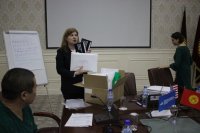 On the last day, a presentation of handbook "How to
counter extremist propaganda” in Kyrgyz and Russian developed by the project
experts exclusively for the media outlets was delivered. The handbooks have
been given to the media in Osh, Jalal-Abad, Batken regions and Bishkek, as well
as to the universities to the departments of journalism and communications.
On the last day, a presentation of handbook "How to
counter extremist propaganda” in Kyrgyz and Russian developed by the project
experts exclusively for the media outlets was delivered. The handbooks have
been given to the media in Osh, Jalal-Abad, Batken regions and Bishkek, as well
as to the universities to the departments of journalism and communications.
The two-day training-workshop was organised by School of Peacemaking and Media Technology in CA under the "Combatting Violent Extremism Through Media and Awareness’ Project implemented with the financial support of the US Embassy in Bishkek.
 School of Peacemaking and Media Technology
in Central Asia supported by the Democracy
Commission of the US Embassy Bishkek announces a competition among journalists who
want to take part in the three-day training workshop on Countering Extremists Propaganda
and Hate in Media to be held in February 26-27-28 February, 2018 in Bishkek. All
costs shall be borne by organizers.
School of Peacemaking and Media Technology
in Central Asia supported by the Democracy
Commission of the US Embassy Bishkek announces a competition among journalists who
want to take part in the three-day training workshop on Countering Extremists Propaganda
and Hate in Media to be held in February 26-27-28 February, 2018 in Bishkek. All
costs shall be borne by organizers.
The training program is based on modern challenges and current needs of journalists. Participants will be taught the methods and tools of coverage of signs of extremism, terrorism and related issues. They will also learn how the hate speech and its communication aspects influence the spread of radical content in the media and on the Internet, understand what errors of journalists and users lead to propaganda of extremism, learn the difference between harmful and illegal content in order to prevent the consequences of transmitting extremist ideology, practice the skills of journalism ethics and legal security.
The training will be held by international and local experts having solid experience.
We are inviting journalists and media activists aged below 35 from all the regions of Kyrgyzstan.
Participants of the training will be selected on a competitive basis. Those selected shall be obliged to take the training program from the beginning to the end.
In order to take part in the competition, please email the following documents to: peacemakingschool@gmail.com:
— a completed application form for participation in the training (download
here)
— a CV,
— a scan of ID.
Only a complete set of documents will be accepted.
Deadline for applications— 5:00 pm February 16, 2018.
Late applications will not be considered.
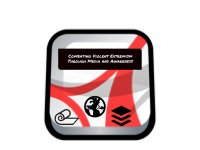 The School of
Peacemaking and Media Technology in Central Asia with the financial support of the Democracy Commission of US Embassy in the
Kyrgyz Republic is implementing the project intended for early warning of
extremist propaganda, by building rapid response for radical discourse via the
media and communications strategies.
The School of
Peacemaking and Media Technology in Central Asia with the financial support of the Democracy Commission of US Embassy in the
Kyrgyz Republic is implementing the project intended for early warning of
extremist propaganda, by building rapid response for radical discourse via the
media and communications strategies.
The analysis of media sphere and internet carried out by the project experts shows that religious intolerance takes one of the top places among all media phobias and can contribute to the conveyance of extremist ideology. The media often form their content based on news events found on the internet. On the one hand, they provide the audience with more diverse information; on the other hand, they can retransmit the ideas of extremism once they get caught by the propaganda. Moreover, when covering extremism and related issues visual content from various online sources is being widely used. This content is often the propaganda of radical narratives leading to violent extremism.
Based on the researche findings, project staff has developed recommendations and tools of combating the propaganda of violent extremism in media and internet such as training programs for journalists and activistc, as well as models of media campaigns on how to treat these issues in the public domain.
"In our project activity, we apply the peacemaking approach to countering hate in the media as an early warning of extremist propaganda” I. Sikorskaya, Director of the School of Peacemaking and Media Technology in CA, said. "Today journalists, internet activists and communicators have found themselves vulnerable to the propaganda of extremism; so our task is to teach them how to effectively respond to the radical discourse.”
In the framework of the project, journalists and activists will be trained the tools that will help them detect extremist propaganda, use advanced methods to report extremism, humanize Islam in stories to overcome the image of the enemy and reduce the risks of extremism propaganda, respond adequately to destructive online communications.
The School of Peacemaking and Media Technology in Central Asia supported by the Canada Fund for Local Initiatives (CFLI) announces the contest for participation in a one-day training "Effective Communications Between the Media and Communities” to be held on November 23, 2017 in Bishkek.
Working language – Russian.
We are inviting PR officers from NGOs involved in diversity and minorities issues, as well as journalists from media outlets that cover these issues. The training covers the techniques of overcoming discrimination in the media, communications tools, developing action plans to encourage diversity in media environment.
Organizers shall cover all costs.
To take part in the contest, the applicant should submit a completed application form (here , a CV of a potential participant, attach a scan of passport, and a letter (on the official letterhead) of the referring entity with the request for participation. The main selection criteria will be the current activity of the applicant in this area, understanding of the significance of diversity in the society, the promotion of vulnerable group issues in the media.
The deadline for applications is 17.00 Bishkek time, November 16, 2017.
All applications with a full package of documents should be submitted at: peacemakingschool@gmail.com
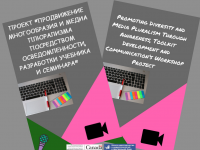 On
September 4, 2017, the Promoting Diversity and Media Pluralism Through Awareness,
Toolkit Development and Communication’s Workshop Project was launched.
On
September 4, 2017, the Promoting Diversity and Media Pluralism Through Awareness,
Toolkit Development and Communication’s Workshop Project was launched.
The project supported by the Canada Fund for Local Initiatives (CFLI).
The main goal of the project is to raise public awareness on diversity through groups and improve the understanding of issues and possibilities to promote pluralism. In order to achieve this goal, a whole range of consultations and meetings with local NGOs, media outlets and public authorities will be held to discuss the action plan on raising public awareness through social media campaigns.
The project staff will be monitoring the discriminatory initiatives and non-tolerance in the media and public discourse meant to constraint of diversity and pluralism in order to find out and prevent possible negative consequences, will develop and distribute the guidance on diversity for media workers and journalists, will organize a workshop on effective communications for activists working in the field of diversity and media.
"Growing non-tolerance, the increase in the number of ultranationalist vigilant groups, ethnic marginalization, violence and discrimination against women, girls, especially in rural areas, and hatred towards LGBT require new approaches in media communications between NGOs involved in minorities issues and media outlets covering such topics,” project manager Inga Sikorskaya said. "We will try to strike a happy medium in these sensitive issues and offer ways of dialog within the society.”
 Discussions about intelligence services keeps a close watch on users of
social media criticizing President A. Atambaev look like attempted censorship
by authorities.
Discussions about intelligence services keeps a close watch on users of
social media criticizing President A. Atambaev look like attempted censorship
by authorities.
In the last few days, the Zhogorku Kenesh (Parlament), media and internet discussthe issues related to the State Committee for National Security [GKNB] checking the posts criticizing the president of the Kyrgyz Republic. According to the official letter from GKNB announced on January 12, 2017 at the meeting of Zhogorku Kenesh in response to the legislator’s request, 10 Facebook users were identified as "spreading and posting negative publications about the head of state.” Also, GKNB reported that it keeps on "taking measures to identify other 35 users.” According to the media message, the representative of the president noted that GKNB thoroughly investigated the posts of users based in Kyrgyzstan according to article "On protection of honor and dignity” under applicable law "On safeguards for the Kyrgyz Republic president’s activities.”
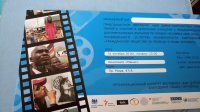 The 10th edition of the Human Rights Film
Festival presents inspiring, topical, and documentary, as well as special interactive discussion that grapple
with the challenges of defending human rights around the world today.
The 10th edition of the Human Rights Film
Festival presents inspiring, topical, and documentary, as well as special interactive discussion that grapple
with the challenges of defending human rights around the world today.
At the festival 5 national films, 9 foreign and 5 films from the CIS countries will be presented. Each film is unique, the films reflect different social problems. The films are grouped as follows:Human rights and resources, Women rights, Human trafficking and child labour, Access to information, Labour rights, Right for education, Children rights.
More
There are many social issues in Kyrgyzstan which have been ignored by society. These include a lack of respect for human rights, gender inequality, and violence towards women and children. Gender violence in particular is widespread in the Kyrgyz Republic, especially in the southern part of the country.Ainagul Amatbekova,a student at Osh State University, an activist for the Public Union "Novi Ritm" and a graduate of the School of Peacemaking and Media Technology.reports on a novel way that activists are fighting gender discrimination and violence in Kyrgyzstan.
Media xenophobia has helped cause divisions in Kyrgyzstan. But
Media xenophobia has helped cause divisions in Kyrgyzstan. But
organisations such as the School of Peacemaking and Media Technology are
challenging those who seek to create tension.
The the School of Peacemaking and Media Technology in Central Asia, a nonprofit organization based in
Kyrgyzstan, hate speech is widely used in media, internet and public discourse.
For example, in the last year more than one third of Kyrgyzstan is have heard,
seen or read in the media statements expressing disapproval, hatred, or
aggression towards minorities, which, according to the respondents, could lead
to violence. Almost half of respondents felt "insecurity and fear of
destabilization, fear for their life and fear of the future."
According to monitoring by the School of Peacemaking

The School of Peacemaking and Media Technology in Central Asia announces an annual competition among students from Kyrgyzstan, Kazakhstan,…
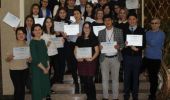
25 journalists and media workers from various regions of Kyrgyzstan have been trained to counter the propaganda of violent extremism and hate in…